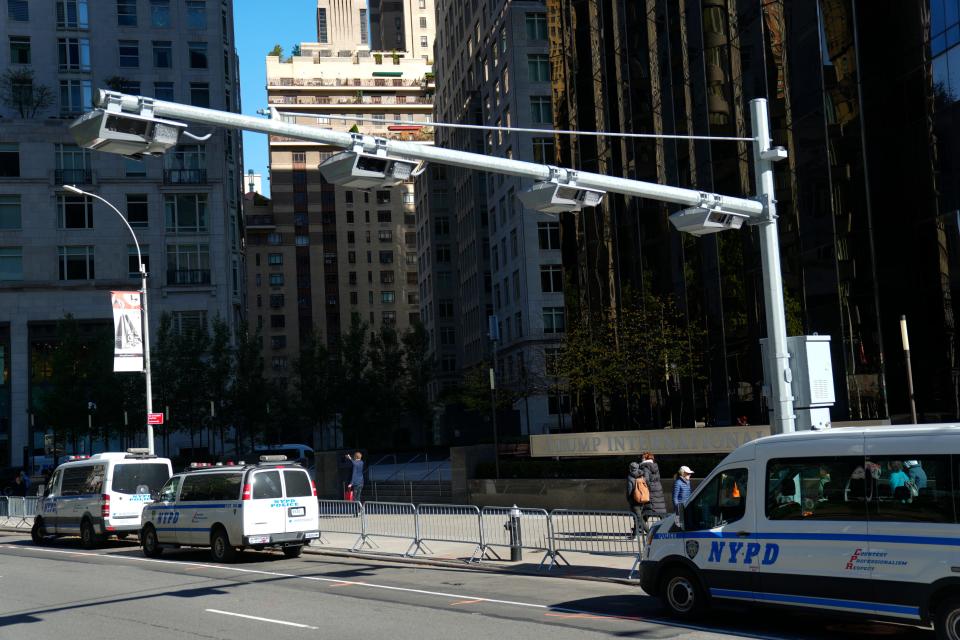Money grab? Study says NYC congestion pricing will generate way more revenue than required
The congestion pricing program that would charge drivers who enter midtown and lower Manhattan could generate around $3.4 billion a year — well above the $1 billion annual revenue the Metropolitan Transportation Authority is required to generate by law — according to an analysis conducted by New Jersey's biggest opponent of the toll plan, U.S. Rep. Josh Gottheimer.
"Our findings on the extent of New York's greed are frankly astonishing and galling," Gottheimer said Thursday. "This just proves that New York’s congestion tax is nothing but a cash grab."
A six-page report from the Democratic congressman used vehicle crossing data from the Port Authority of New York and New Jersey, the Traffic Mobility Review Board's report and the Metropolitan Transportation Council's Hub Bound Travel Data Report to break down estimates of the number of vehicles that could get tolled at each crossing during peak and off-peak hours on weekdays and weekends.
Gottheimer's team predicts that the bulk of the revenue, around $2.5 billion, will get raised during weekdays and $840 million on weekends. The $3.4 billion estimate included the $5 credits proposed at four crossings, including the Lincoln and Holland tunnels, and the MTA's prediction that vehicle traffic will decrease 17% once the $15 toll goes into effect, expected to happen this spring.
Story continues below photo gallery.
The MTA did not respond to numerous questions about whether it has done an analysis of how much revenue it expects to generate from the program, and it did not deny Gottheimer's report findings. The agency has not publicly provided any information about how much revenue it expects to generate based on the newly released congestion pricing recommendations.
"Gridlock Gottheimer still thinks more cars, more congestion and more pollution is the answer to the region’s clogged streets, and here he is again with yet another publicity stunt fighting for the status quo and to keep ambulances, firetrucks and delivery vehicles stuck in traffic," said John J. McCarthy, chief of policy and external relations at the MTA.
The Port Authority could also lose around $83 million a year due to the decrease in vehicles at the Lincoln and Holland tunnels, the report said — a concern Gottheimer has noted could affect the bistate agency's capital plan.
Reduce congestion, improve air quality, raise revenue
Congestion pricing is designed to toll drivers who enter the most congested portion of the city, midtown Manhattan below 60th Street, except those who remain on the perimeter highways.
The goals of the program are to reduce congestion, improve air quality and generate $1 billion a year for the MTA's public transportation capital program.
The Traffic Mobility Review Board was created to recommend how to design the program, including what the tolls should be, whether credits should be granted to drivers already paying tolls and whether any drivers should be exempt.
The board published its recommendations in November, though one member resigned in advance of the publication after making numerous complaints that MTA CEO Janno Lieber was too focused on "the revenue generation side of the new tolling system and he doesn’t care about reducing congestion,” the New York Post reported.
Voice your opinion: Public hearing dates for MTA congestion pricing toll plan announced
Increased traffic?: Could GW Bridge traffic increase from congestion pricing? Here's what one report said
The board recommended a $15 toll for those with E-ZPass at peak hours on weekdays and weekends, $22.50 for those without E-ZPass at peak hours on weekdays and weekends, $5 credits for those who use the Lincoln Tunnel, Holland Tunnel, Queens-Midtown Tunnel or Hugh Carey Tunnel, a $3.75 toll off-peak between 9 p.m. and 5 a.m. on weekdays, and a $3.75 toll off-peak on weekends between 9 p.m. and 9 a.m.
There are different rates for trucks.
Rates can also go up on "gridlock alert days," when traffic in the city is expected to be worse than usual.

Even with the $5 credit and reduction for having E-ZPass, New Jersey drivers crossing at the Lincoln and Holland tunnels will face the $10 congestion pricing toll plus the newly raised $15.38 E-ZPass peak hour toll rate from the Port Authority at either of those tunnels.
That's well more more than the collective $17 that drivers will pay at the Hugh Carey and Queens-Midtown tunnels and $15 in tolls New York drivers will pay if they get to midtown Manhattan using free crossings like the Third Avenue and Queensboro bridges.
More traffic for Fort Lee, George Washington Bridge?
The disproportionate tolling costs perpetuated by congestion pricing could exacerbate "toll shopping," critics argue, which is congestion caused by drivers who go out of their way to use the cheapest crossings instead of the most direct route to their destination.
Residents of Fort Lee, for example, are concerned that more trucks and cars will flock to the George Washington Bridge and increase traffic there to avoid the congestion charge, which is among the allegations raised in a lawsuit filed last year.
New Jersey Gov. Phil Murphy's administration also filed a lawsuit last year accusing the Federal Highway Administration of violating federal law by not requiring a more thorough environmental review of the congestion pricing program.
Two more lawsuits opposing the program have been filed in New York, including one from the United Federation of Teachers filed Thursday, raising similar allegations to those of the lawsuits filed in New Jersey.
The other suit was filed by community members in Battery Park City who are concerned about ambulances potentially sitting in more traffic on the West Side Highway, since traffic could increase there because drivers on Manhattan's perimeter highways will not be tolled.
This article originally appeared on NorthJersey.com: Will NYC congestion pricing collect billions more than required?

